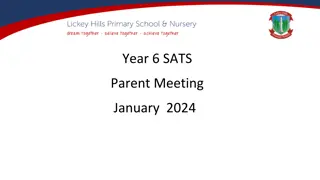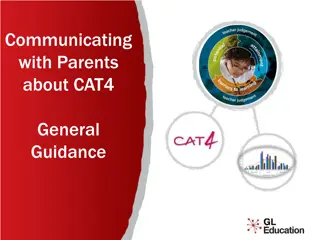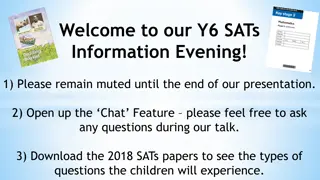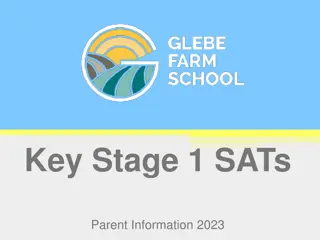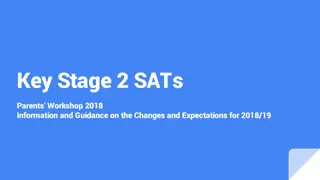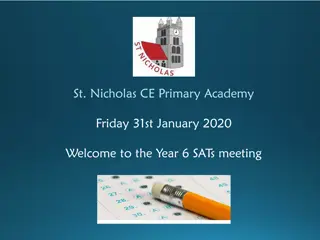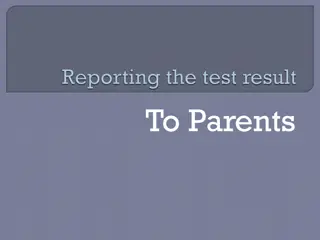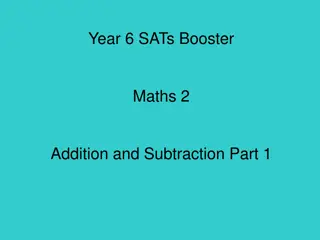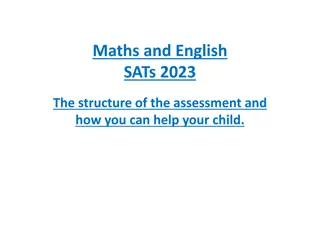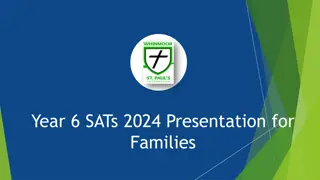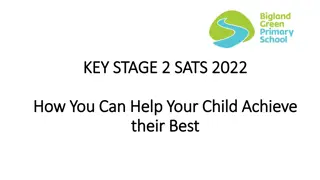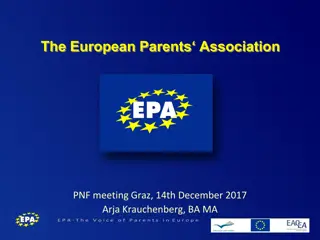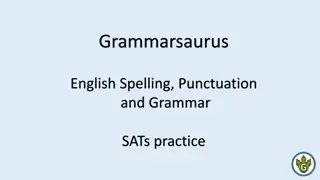Understanding SATs: A Guide for Parents
SATs are Statutory Assessment Tests in English and Mathematics taken by children at the end of Key Stage 1 and Key Stage 2. Children are tested on various topics such as English reading, spelling, grammar, arithmetic, and reasoning papers in Mathematics. The tests cover a wide range of topics including calculations, fractions, percentages, and more. Parents can help children prepare by practicing times tables, calculations, and keeping up with homework revisions.
Download Presentation

Please find below an Image/Link to download the presentation.
The content on the website is provided AS IS for your information and personal use only. It may not be sold, licensed, or shared on other websites without obtaining consent from the author. Download presentation by click this link. If you encounter any issues during the download, it is possible that the publisher has removed the file from their server.
E N D
Presentation Transcript
Parents Meeting Friday 17thMarch 2023
WHAT ARE SATS AND WHY DO CHILDREN TAKE THEM? S Statutory A - Assessment T - Tests End of Key Stage measure of attainment and pupil progress. KS1 - Year 2, KS2 Year 6
What are children tested on? English reading, spelling, grammar and punctuation Mathematics 2 x reasoning papers and an arithmetic paper
Arithmetic Maths test Paper 1 40 marks on calculations-lasting 30 mins-which cover the four rules, adding/subtracting/multiplying/dividing fractions, calculating percentages, working with decimals numbers. o Lots of experience children have been tested each week since the beginning of year 6 and have practised the key skills to complete the test. How to help at home: Any work on times tables or practise calculations in the four operations. Internet games on calculation speed and number knowledge. Children keeping up with homework revision.
What is being tested Children are tested on the following: Addition Subtraction Multiplication (including long multiplication) Division (including long division) Decimal numbers (various forms) Percentages Fractions (fractions in various forms) e.g. multiplying, adding and conversion of fractions. BODMAS Missing numbers in calculations Squaring and cubing numbers
Sample Questions Maths Paper 1: Arithmetic
Reasoning Maths Papers Paper 2 and Paper 3 Each of 40 minutes. Children are tested on how they reason questions through and use their maths knowledge to access a mathematical problem. Questions are usually worded or use illustrations e.g. triangles, timetables and charts. Each question has more than one step and the children must figure out these steps. The weekly tutoring sessions have been focussing on these questions all year.
Sample Questions Maths Paper 2 / Paper 3 : Reasoning
Sample Questions Maths Paper 2 / Paper 3 : Reasoning
Reading The Reading Test consists of a single test paper with three unrelated The Reading Test consists of a single test paper with three unrelated reading texts. reading texts. Children are given 60 minutes in total, which includes reading the texts and answering the questions. and answering the questions. Children are given 60 minutes in total, which includes reading the texts A total of 50 marks are available. A total of 50 marks are available. Questions are designed to assess the comprehension and understanding of a child s reading. Questions are designed to assess the comprehension and understanding of a child s reading. Some questions are multiple choice or selected response, others require short answers and some require an extended response or explanation. Some questions are multiple choice or selected response, others require short answers and some require an extended response or explanation. Previous papers are available online to look through by typing into google search previous SATS papers. Helping at home Children to read class library book which is targeted at the correct level. Encourage children to talk about the book and discuss characters, actions etc.
Spelling, Punctuation and Grammar A Spelling test is administered containing 20 words, lasting approximately 15 minutes. A Spelling test is administered containing 20 words, lasting approximately 15 minutes. A separate test is given on Punctuation, Vocabulary and Grammar A separate test is given on Punctuation, Vocabulary and Grammar This test lasts for 45 minutes and requires short answer questions, including some multiple choice. This test lasts for 45 minutes and requires short answer questions, including some multiple choice. Marks for these two tests are added together to give a total for Spelling, Punctuation and Grammar. Marks for these two tests are added together to give a total for Spelling, Punctuation and Grammar. Again samples are available online. Children have been working through these skills in class and have been exposed to the vocabulary.
Sample Questions Grammar, Punctuation and Spelling Paper 1
Spelling Children will have 20 spellings following patterns and formations taught throughout key stage 2. Y3/4 and Y5/6 words. Spelling 18: The word is tongue. I burnt my tongue on the hot soup. The word is tongue. Spelling 19: The word is accidentally. Sarah accidentally spilled water all over the table. The word is accidentally. Spelling 20: The word is deceive. The criminal tried to deceive the police. The word is deceive.
Marks available in each test English grammar, punctuation and spelling Paper 1: 50 marks 70 marks English grammar, punctuation and spelling Paper 2: spelling Mathematics Paper 1: arithmetic Mathematics Paper 2: reasoning Mathematics Paper 3: reasoning 20 marks 40 marks 35 marks 110 marks 35 marks
Scaled Scores- what is meant by scaled scores? When the children have completed their SATS they will receive a RAW score When the children have completed their SATS they will receive a RAW score and a scaled score. The scaled score shows if the child is: and a scaled score. The scaled score shows if the child is: Working towards year 6 standards Working towards year 6 standards At year 6 standards At year 6 standards At greater depth At greater depth A scaled score of less than 100 represents that the child is still working A scaled score of less than 100 represents that the child is still working towards end of year 6 expectations towards end of year 6 expectations A scaled score of between 100 and 109 represents that the child is working at A scaled score of between 100 and 109 represents that the child is working at expected level expected level A scaled score of between 110 and 120 represents that they are at greater A scaled score of between 110 and 120 represents that they are at greater depth and have achieved an advanced understanding. depth and have achieved an advanced understanding. E.g. in maths if a child scores 57 out of 110 it generates a scaled score of 100 E.g. in maths if a child scores 57 out of 110 it generates a scaled score of 100 meaning that child has reached the expected standard. meaning that child has reached the expected standard. All scaled scores can be found on the governments education website. The All scaled scores can be found on the governments education website. The children will know what to aim for through practise week feedback.
When will the tests take place? Tuesday 9th May 2023 Spelling, Punctuation & Grammar Paper 1 Spelling Punctuation & Grammar Paper 2 Wednesday 10th May 2023 English Reading Maths Paper 1 (Arithmetic) Maths Paper 2 (Reasoning) Thursday 11th May 2023 Friday 12th May 2022 Maths Paper 3 (Reasoning)
Arrangements for test day The tests will take place in the school hall. The children will have completed a number of practice rounds and will be familiar with the set up and the place in which they sit. Children are encouraged to visit the toilet and ensure they are well hydrated and comfortable before the test. Children are allowed to bring a water bottle to the test Children are allowed to ask for questions to be read aloud to them (with the exception of the reading test which is completely independent). Staff may only read the question children are not allowed any help with spelling or to ask for clarification on answers maths numbers and words only. Children have the start and end time for each test displayed and are given reminders at timed intervals which they are used to as part of our test preparation sessions. Governors will moderate a selection of the assessments
After the tests During test week, the afternoon sessions will be used for children to go over anything they may be anxious about for the following day. However, primarily children will have opportunity to take part in lessons where other skills are required such as PE, Art, etc. Therefore children are asked to ensure outdoor PE kit is brought in every day during that week
When will parents be informed of pupils results and who else will use these results? Tests come into school on various days throughout July. Parents will be informed of test results in a letter sent home with their child after the children have been informed. Pupil s test results are transferred electronically to the appropriate Secondary school. Children will be told their results by Mrs Gray in a discrete way. All results are handled sensitively and privately.
Should my child be revising at home? Your child may wish to do some revision at home and this should be encouraged to enable your child to feel as confident as possible going into their tests. However, the best idea is little and often. Where possible children should be able to use ICT, games etc to help them revise to make it a little bit more exciting. The children can have any additional paper based resources that you feel would be helpful. It is important that if your child is finding a particular area of reading/maths difficult they must speak with their teacher or Mrs Gray
How can i help my child on the lead up to and on test day? possible. Attendance - ensure your child is in school as much as Regular and appropriate bedtimes. Please make sure that they do not have a late night as this will make them tired and they will not be able to concentrate. Let school know as early as possible if your child is ill during test week and if any special arrangements need to be made. Communicate if there has been any upheaval or upset at home that may affect the pupil s access/performance in the test. Ensure your child has breakfast and a bottle of water during test week. All children will be supplied with fruit during morning break




